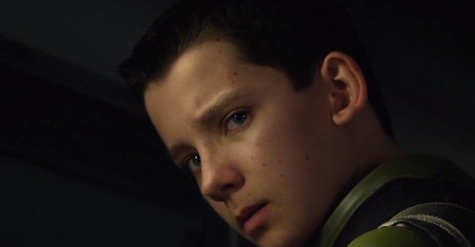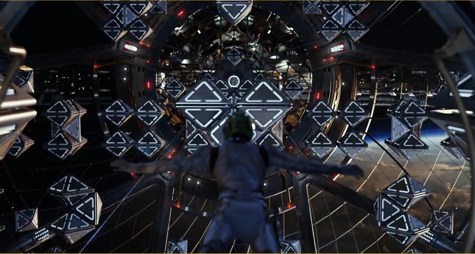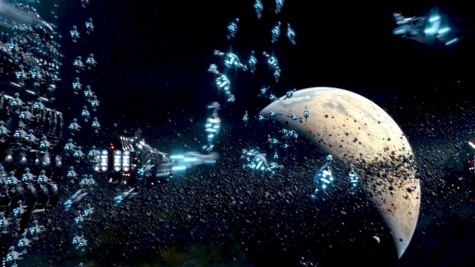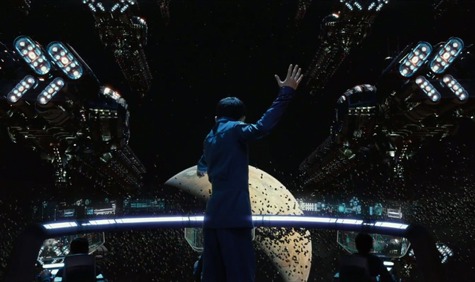Ender’s Game is an important gateway to hordes of SFF fans. I’ve heard many call it one of the few stories that can get self-proclaimed genre-haters to love science fiction, and I’m not inclined to dispute the statement. And with the film in development hell for years, a silver screen appearance has been awaited for quite some time.
So… what happens in Battle School stays in Battle School?
Warning: Mild spoilers for the film below.
Ender’s Game opens with a quote from A.E. Wiggin himself that likely made the history books, and propaganda footage of Mazer Rackham defeating the Formics in their first war against us humans. We’re quickly introduced to Ender and his abilities, and soon he’s whisked away to Battle School by the ever-gruff Colonel Graff. The role is perfectly suited to Harrison Ford, who has the chance to be non-heroic, but still do his thing. Asa Butterfield starts off a little shaky in his portrayal of Ender, but soon shrugs off his nerves and steps right into a horrifically challenging role. Brutal but always sympathetic, Ender is appropriately layered and never fails to be likeable. Thumbs up a thousand times over on casting throughout the film, kids included (which is no small feat).

It’s exciting to see a properly multi-ethnic cast for a story set in our future that features global cooperation in a war effort. The participation of so many nationalities, of so many different types of people, lends the film a credibility that movies and shows of a similar ilk fail at time and again. There is no lip service being paid; it is clear that every child in Battle School could come from any place on Earth.
For those eager to see those Battle School fights, Ender’s time there might be the strongest point of the film. The scenes are beautifully laid out, exciting and full of momentum. Watching Ender rise through the ranks and watching the other children react to him is where the core of the movie houses itself, the smart place to build characters and relationships. Despite the fact that very few lines are drawn word for word from the novel—generally how it should be where film is concerned—the movie manages to hit practically every important emotional note of the story. It is clear that director Gavin Hood has a strong connection to the source material and was keen on packing in everything relevant.

The film is a bit black and white in its character juxtapositions when compared with the novel. Both Peter (Jimmy Pinchak) and Valentine (Abigail Breslin) as well as Graff and Anderson (Viola Davis) occupy more drastic positions on the good vs evil scale, with Anderson far more sympathetic due to Davis’ affecting portrayal and Peter coming off as flat out evil with no hint of possible conscience or complexity lurking. Viewers with no knowledge of the story will likely not be bothered, but fans might find a few things to quibble over.
There’s a super awkward romantic angle that the script seems to be playing between Ender and Petra, which might have potentially made sense given that Ender is portrayed older this time around—unfortunately it comes off entirely forced, as though the desire to play to the YA crowd resulted in a half-arsed attempt to inject something sweet into a story that has no room for sweetness. It’s really too bad because Hailee Steinfeld is excellent in the role, and making their friendship a more central relationship to the story is otherwise a welcome alteration.
In terms of design, the movie is something of a marvel; ship designs and the visuals for the space battles alone are full of wonder if only because they look so unique when compared with most science fiction films. The formation of a Formic fleet and the strategies informed by a three-dimensional battlefield have clearly been carefully considered here, and the result is war in space that holds far more intrigue than average. The soundtrack by Steve Jablonsky is also lovely (which is a thing I always care about, so I’m telling you even if you don’t care), a nice changeup from his Transformers scores.

Sadly, things do eventually all fall apart. While Hood took such pains to hit every emotional high in the story, the movie skips out on the most important part—the ending. Those who don’t know how this book works are still probably aware that the ending contains a twist of the decidedly epic variety. But when that twist hits, I’m not certain that fans who are not familiar with the book will understand what has happened. Explanations are tossed out at a dizzying pace before it’s possible to catch up. Nothing is given room to land.
More importantly, there is a specifically deranged moment where the audience is about to see Ender Wiggin fall to pieces, only to have his intense emotional breakdown paused so he can have another fight with Harrison Ford. Whoever made this choice for the denouement must hate emotional progression, as the brief moment we’re allowed with Butterfield is anguishing. If only he’d been given the respect and time to play out the arc, the movie might have been something extraordinary. But from there on, we are instantly rushed to the finish line, and all the impact of the story’s message is lost in weak narration and misguided soundbites of morality.
So much potential thrown out with the sort of attention you would pay to dirty dishwater. One has to wonder where it all went off the rails. If Katniss Everdeen gets four movies to explore a very similar theme, you’d think they could have tacked on twenty minutes to Ender’s Game so it could really sing.
Emmet Asher-Perrin is seriously pained over how they steamrollered all the emotions. You can bug her on Twitter and read more of her work here and elsewhere.










